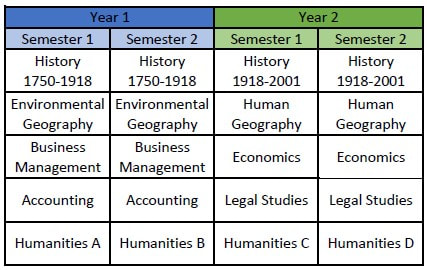Choose 1 from each semester from any of the subjects below
History 1750 - 1918
Students will study the making of the modern world in the period 1750 – 1918. They explore the industrial revolution, migration of people, colonisation of Australia and World War One. Students analyse intended and unintended causes and consequences of significant events, ideas, individuals and places.
For students considering VCE History in future, this subject is recommend.
For students considering VCE History in future, this subject is recommend.
Environmental Geography
Students will study the relationship between humans and their environment by interpreting, collecting and recording a range of geographical data. They consider environmental change, its consequences and identify strategies to manage these changes now and in the future. Students also examine the environmental, economic and technological factors that influence crop yields and food security in Australia and across the world.
For students considering VCE Geography, this subject is recommend.
For students considering VCE Geography, this subject is recommend.
Business Management
Students will explore the nature of innovation, looking into how businesses create and maintain a competitive advantage. They identify the behaviours and capabilities that make a successful entrepreneur, how to develop business ideas, investigate the production process and the resources needed for a successful business while being socially responsible. Students also study business structures, marketing, staff recruitment, and the future of work.
For students considering VCE Business Management, this subject is recommend.
For students considering VCE Business Management, this subject is recommend.
Accounting
Students explore the establishment of a business and the role of accounting in the determination of business success or failure. Students consider the importance of accounting information for stakeholders.
Students analyse, interpret and evaluate business performance using financial and non-financial information. They use these evaluations to make recommendations regarding the suitability of a business as an investment.
Students use both manual methods and information communication technology to record financial data and report accounting information. They apply accounting assumptions and qualitative characteristics, and use business documents and indicators to measure business performance in order to consider the success or failure of the business.
Over the semester, students identify accounting concepts and principles, calculate tax refundable or payable to the Australian Taxation Office, prepare personal budgets and compile balance sheets.
Students analyse, interpret and evaluate business performance using financial and non-financial information. They use these evaluations to make recommendations regarding the suitability of a business as an investment.
Students use both manual methods and information communication technology to record financial data and report accounting information. They apply accounting assumptions and qualitative characteristics, and use business documents and indicators to measure business performance in order to consider the success or failure of the business.
Over the semester, students identify accounting concepts and principles, calculate tax refundable or payable to the Australian Taxation Office, prepare personal budgets and compile balance sheets.
Humanities A & Humanities B
Students will undertake immersive and hands-on learning experiences across the four humanities disciplines (history, geography, business and civics) in a series of short modules. We will be exposed to a broad range of topics in order to develop the transferable skills needed to navigate the world we live in, now and in the future.
Humanities A, B, C, and D follow the same approach, but are not a learning sequence. These subjects provide an alternative for students who do not wish to undertake a in depth humanities subject at VCE level or who have a general interest in the humanities.
Humanities A, B, C, and D follow the same approach, but are not a learning sequence. These subjects provide an alternative for students who do not wish to undertake a in depth humanities subject at VCE level or who have a general interest in the humanities.
